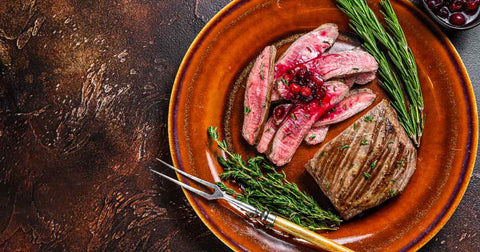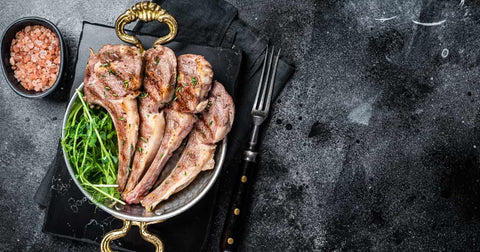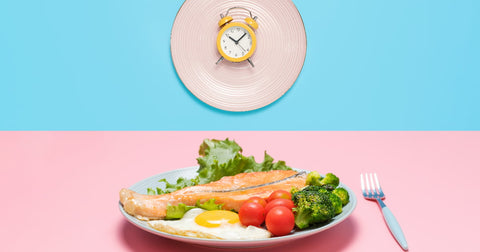If you're exploring cleaner sources of protein or considering wild game meats, you’ve likely asked yourself, is venison healthy? The answer isn’t just yes or no it depends on factors like preparation, individual dietary needs, and even food sensitivity.
This guide will explore everything from is deer meat healthy compared to beef, to is venison high in cholesterol, and even whether it poses risks. You'll also discover when to consider a food sensitivity test kit if you experience unusual symptoms after eating venison meat.

What Is Venison and Is It Red Meat?
First, let’s clarify: is venison red meat? Yes. Venison meat from deer is classified as red meat, just like beef, lamb, and pork. It’s deeply pigmented due to its high myoglobin content, giving it a rich color and distinct, slightly gamey flavor.
Common types of venison:
-
White-tailed deer (most common in North America)
-
Mule deer
-
Red deer (popular in Europe and New Zealand)
-
Elk (technically a type of venison, often referred to separately)
Though it's a red meat, venison stands apart in nutritional value and environmental impact, especially when compared to conventionally raised livestock.
Is Venison Healthy Compared to Other Meats?
If you're wondering is venison healthier than beef, the answer is often yes particularly when it comes to fat and calorie content.
Here’s how venison compares nutritionally (per 3.5 oz cooked serving):

-
Calories: ~150 (vs. beef’s ~250)
-
Fat: ~3g (vs. beef’s ~20g)
-
Protein: ~26g (high-quality, lean protein)
-
Iron: Comparable or higher than beef
-
Cholesterol: Lower than beef, but still present (~95mg)
Venison is incredibly lean and nutrient-dense, making it a great option for people on high-protein or low-fat diets. It’s also free from antibiotics and hormones when sourced from wild deer or regulated hunters.
Is Deer Meat Healthy for Your Heart?
Deer meat is leaner than most farm-raised red meats, which makes it a better option for heart-conscious individuals. It contains less saturated fat, which is linked to elevated LDL (bad) cholesterol.
However, because it's still red meat, moderation is important especially for people managing cardiovascular health or high cholesterol.
Is venison high in cholesterol?
Venison does contain cholesterol about 95 mg per 3.5 oz serving which is slightly less than beef. For healthy individuals, this isn’t a major concern, but those with existing cholesterol issues should monitor intake and balance it with heart-healthy foods.
Benefits of Eating Venison Meat
Here’s why so many health conscious eaters are turning to venison:
1. Lean, High-Quality Protein
Venison provides a full spectrum of amino acids with minimal fat, supporting muscle repair, immune health, and satiety.
2. Rich in Iron and B Vitamins
Iron from red meat is more bioavailable than plant sources, making venison a solid option for preventing anemia. It also contains B6 and B12, essential for nerve health and energy.
3. Fewer Hormones and Antibiotics
Wild deer are not exposed to the synthetic hormones or antibiotics used in commercial meat production.
4. Lower Environmental Impact
Sourcing wild venison can be more sustainable than factory-farmed meat, reducing the carbon footprint associated with livestock farming.
Dangers of Eating Deer Meat: What to Watch For

While generally safe and nutritious, there are a few considerations and dangers of eating deer meat you should be aware of.
1. Improper Cooking or Handling
Because venison is often hunted, it may carry bacteria or parasites (like Toxoplasma or E. coli) if not processed correctly. Always cook venison to an internal temperature of 160°F to kill harmful pathogens.
2. Lead Exposure
Some hunters use lead bullets, and fragments may remain in the meat. Opt for meat processed with non-lead ammunition or ask your supplier about sourcing.
3. Chronic Wasting Disease (CWD)
This neurological disease affects deer populations in some areas. Though there's no confirmed transmission to humans, it's best to avoid consuming meat from infected animals.
Food Intolerance and Venison: Could It Be Causing Symptoms?
Even though venison is often praised as a “clean” meat, it’s possible to react poorly to it especially if you have food intolerance or sensitivities.
Symptoms of food intolerance may include:
-
Bloating or digestive discomfort
-
Skin issues
-
Fatigue or brain fog
If you feel unwell after eating red meat or wild game, a food sensitivity test kit can help you pinpoint whether venison (or something else in your diet) is triggering inflammation or discomfort.
Who Should and Shouldn’t Eat Venison?
Venison is ideal for:
-
High-protein, low-fat diets
-
Paleo, keto, or carnivore diets
-
Individuals with food sensitivities to farmed meats
-
People looking to avoid hormones and antibiotics in conventional meat
Caution is advised for:
-
Those with high cholesterol (due to red meat intake)
-
Individuals with known red meat intolerance
-
Pregnant women or immunocompromised individuals (due to infection risk from undercooked meat)
Final Verdict: Is Venison Healthy?

Yes venison is healthy when properly sourced, cooked, and eaten in moderation. It’s lean, packed with nutrients, and free from many of the additives found in store-bought meats. For those looking to cut calories or reduce saturated fat, venison can be a smart swap for beef.
However, not all bodies respond the same way. If you suspect red meat or wild game causes bloating or discomfort, a food sensitivity test kit can provide valuable answers helping you enjoy your meals without mystery symptoms.
Frequently Asked Questions (FAQs)
1. Is deer meat healthy compared to beef?
Yes. Venison is leaner, lower in fat and calories, and free from additives commonly found in beef.
2. Is venison high in cholesterol?
It contains moderate cholesterol levels less than beef, but still something to monitor if you have cholesterol concerns.
3. Is venison red meat?
Yes. It’s classified as red meat due to its color and myoglobin content, similar to beef or lamb.
4. What are the dangers of eating deer meat?
Undercooked venison can carry bacteria or parasites, and there is a small risk of lead contamination from hunting ammo.
5. Should I take a food sensitivity test kit if I feel unwell after eating venison?
Yes. If venison causes bloating, fatigue, or other symptoms, testing for food intolerance can help determine if it’s the trigger.


.png?v=1737390083)
.png?v=1737187409)


